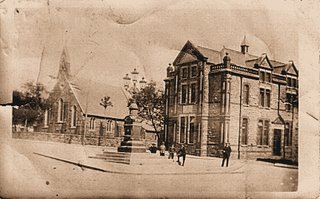D. R. Davies III: Child of Poverty
 The house of prayer that D. R. Davies grew up in was also a house of poverty. Before D. R. Davies was born, his father had been seriously injured in a mine accident which left him unable to work for a decade, and rendered him unable to work underground ever again. To support the family, Mrs. Davies ran a shop, as well as selling sand. D. R. Davies sold this from door to door during the week-end, and kippers during the week.
The house of prayer that D. R. Davies grew up in was also a house of poverty. Before D. R. Davies was born, his father had been seriously injured in a mine accident which left him unable to work for a decade, and rendered him unable to work underground ever again. To support the family, Mrs. Davies ran a shop, as well as selling sand. D. R. Davies sold this from door to door during the week-end, and kippers during the week.After the move to Clydach-on-Tawe, things became more secure. Mr. Davies became a paid choirmaster at the Independent Chapel, and got a job above ground at a local pit. With the wages of D. R's brother, the full amount came to three pounds. Accordingly, D. R. took a job as a butcher's errand boy on Saturdays, for a shilling and two free meals. He also had a paper-round, and it was this that, Davies wrote in his memoirs, that pointed to a grave flaw in his character:
"One winter evening, when I was about half way on my round, I suddenly felt I did not want to do this work any more. The revulsion was so strong that it obsessed my whole being. It paralysed my will. What was to be done? There I was, with several dozens of papers which I was determined not to deliver. [...]
"I solved the problem by pretending to be ill. I sat down in the street with my bundle beside me, and holding my stomach with both hands, I groaned and cried. Before long I believed I was really ill. I have always beeen able to believe my own lies for a while. I soon gathered a little crowd around me, and became the object of general sympathy. A kindly soul took the papers back to the shop, and another took me home and explained matters to my mother [...]. In this [...] incident of my boyhood emerged the fundamental problem of my life, the solution of which lay beyond my power. I want to emphasise that fact. The same situation, in different terms, of course, recurred many times. Each time I was helpless. I was seized by a sudden, irresistible revulsion against doing what I knew should be done. I dod not do it. Instead, I lied: I pretended; I deceived myself; I rationalized. I knew what I ought to do. But I could not do it. That I did not admit my inability was my own sin and tragedy. I believed in my own lie."
Unknown to Davies, that ability for self-deception would soon be demonstrated still more strongly. For his household was to be caught up in the events of the Welsh Revival of 1904-5 in a very personal way.
Labels: D. R. Davies

0 Comments:
Post a Comment
<< Home